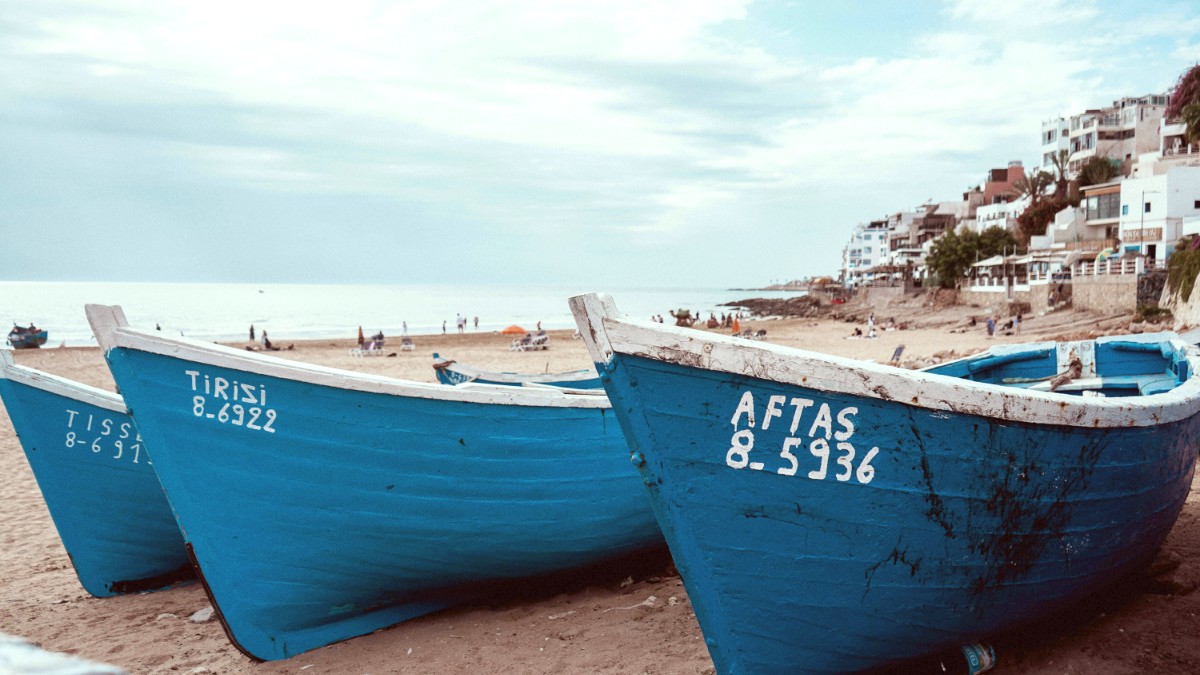
Morocco
Moroccan cuisine reflects centuries of trade routes and cultural exchanges. Berber traditions offer hearty dishes, while Arab and Andalusian influences contribute sophisticated spices and cooking methods.
Fresh vegetables, lamb, beef, chicken, and abundant seafood define the flavors. Aromatic spices include cumin, turmeric, ginger, paprika, saffron, cinnamon, and Ras el hanout. Argan oil, unique to the region, is used culinarily and cosmetically. Olives, preserved lemons, dried fruits, and fresh herbs are staples.
Moroccans are very hospitable. Expect to be offered mint tea upon arrival; accepting shows respect.
Traditionally, use your right hand to scoop food with bread from communal dishes. Cutlery is available in tourist restaurants.
Mint tea is a symbol of hospitality, served throughout the day, poured from a height to create froth.
Slow-cooked stew named after its conical clay pot. A staple of Moroccan cuisine.
Found at almost every local restaurant and surf camp.
Steamed semolina grains with meat (lamb/chicken) and slow-cooked vegetables in rich broth.
Traditionally eaten on Fridays; many local restaurants offer a special dish.
Hearty Moroccan soup with lentils, chickpeas, tomatoes, herbs, and sometimes meat.
Provides warmth and nourishment, found year-round in local eateries.
Iconic sweet green tea with fresh mint leaves, a symbol of hospitality, consumed throughout the day.
Widely available and delicious, especially during the citrus season. Alcohol: Limited; found in larger hotels/resorts and select tourist restaurants. Respect local customs.
Less common in Taghazout village. Explore resorts in Taghazout Bay (Fairmont, Hyatt Place) for sophisticated menus and elegant ambiance.
Numerous local restaurants and surf camp eateries in Taghazout village. They specialize in fresh seafood and offer a mix of Moroccan and international dishes.
Small local cafes ("Snack") are prevalent, offering affordable and hearty meals like simple tagines, sandwiches, and omelets. Great for a quick, cheap, and authentic bite.
Many restaurants provide international dishes like pizza, pasta, burgers, crepes, and Asian-inspired meals.
A good variety if you need a break from Moroccan flavors.
If you have severe allergies or specific dietary needs, book accommodation with kitchen facilities to prepare your own meals.
Utilize fresh ingredients from local markets.
Many cafes feature stunning ocean views, especially at sunset.
Informal setups near the beach grill daily catch directly.
Visit local markets for immersive shopping and culinary insights.
Taste and buy unique argan oil from local cooperatives.
As a Muslim country, almost all meat served is Halal, prepared according to Islamic dietary laws.
Finding Halal food is not an issue.
Kosher food is very difficult to find outside specific Jewish community centers in larger cities like Casablanca.
Taghazout offers no specific Kosher restaurants.
Some surf camps or guesthouses offer informal Moroccan cooking workshops.
More extensive food tours focusing on street food or market exploration are available in Agadir or Marrakech.
Some surf camps or guesthouses offer informal Moroccan cooking classes.
Visit women's cooperatives on the road to Essaouira to learn about traditional argan oil extraction.
Taghazout does not host major food festivals, but larger Moroccan cities may host culinary events.
Immerse yourself in the atmosphere of Aourir (Banana Village) Market or the vast Souk El Had in Agadir for fresh produce and spices.
Purchase ingredients if your accommodation has a kitchen.
Remember Moroccan hospitality, the ritual of mint tea, and eating with your right hand from communal dishes if appropriate.
"Bismillah" before meals, "Alhamdulillah" after.
Try small local cafes ("Snack") for authentic and affordable meals, often serving simple tagines or sandwiches.
Carry cash for smaller local places and street food vendors, as card payments are less common outside larger establishments.
Embrace the rich, aromatic spices and fresh ingredients that define Moroccan cuisine, specifically the abundant seafood on the coast.
Engage with Moroccan food through unique experiences like cooking classes and visits to Argan oil cooperatives. Explore diverse dining from fine establishments to street food.